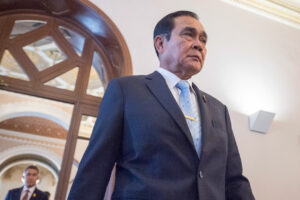Whose turn is it?

ONE of life’s lessons in etiquette, pounded into us by our parents, was the importance of waiting for your turn to speak at any social gathering. When the adults were talking at the dinner table, children (until they became parents themselves) were not allowed to butt in, except to ask for more ice cream. Such unauthorized verbal intrusion was peremptorily checked — Hey, Cashew Nut, wait for us to stop talking.
The importance of waiting for one’s turn was highlighted in virtual meetings. The meeting app even included icons like a raised hand for the person who wanted to give his two cents worth in the discussion. He patiently waited for the moderator or chair to call him to speak. (You are on mute.) The inability to read body language, such as squirming in one’s seat as if wanting to take a pee, was not always possible in the virtual meeting. So, the default behavior had to be waiting to be called, sometimes never. (Are there other matters you wish to take up?)
There are social rules for taking turns in a discussion.
Talk shows are ruled by a moderator. Even here, she sometimes encourages a verbal melee to spice up the show. The only stop invoked is an advertising break.
At wedding receptions, conversation tends to be limited to proximate seatmates. Very seldom is the whole table involved, so there is no need to wait for one’s turn. This sometimes leads to untapping place cards from their set positions to acquire a more familiar seatmate. This is not possible at the presidential table where place cards are sewn.
In corporate settings, turn-taking tends to be hierarchically driven. Never interrupt the conversational flow of someone who outranks you. Anyone with a higher rank can derail your boring lecture on the character profiles of Dostoevsky novels. If the CEO is describing his day at the golf course and his lousy swing, lower life forms need to show awe at the missed hole-in-one being reported — I was just 20 feet away.
What is the applicable rule in table conversation if the CEO of one company is seated next to another CEO? Is market cap to be the tiebreaker? What if one CEO is taciturn and concentrating on his soup with no intention of saying anything (or having anything said to him)? Who regulates the chat traffic in a ten-seater with all CEO’s? Often, these characters already know one another. The owner of a chain of barbecue stands needs to give way to all the others.
Hierarchical guidelines are not observed in less structured settings. Informal structures apply to certain industries like advertising, or small companies dealing with preserved fruits with less than 50 employees, including fruit pickers.
With more defined status rankings, turn-taking is strict. These include military organizations, church functionaries (except in confession where the penitent is allowed to pour his heart out), and large listed companies. Political characters too adhere to the oral hierarchy. Appointees are lower life forms than elected officials. Lobbyists are at the end of the tail.
Business associations are tricky as the officers who should have the upper hand may belong to smaller companies than those of regular members in small committees, like metropolitan traffic. Collegiality prevails here as turn-taking rules are loosened.
Celebrity has its own cache. Do former beauty queens take precedence over political appointees in sub-cabinet positions? (Yes.) Do unknown “influencers” have the right to bash celebrities? (No.) Does a powerful person at the top of the food chain maintain his conversational perch if he had just fallen from grace? (No, unless this has not yet been announced.)
Interruptions anyway are seldom acceptable. It is best to let someone finish his sentence before jumping into the verbal queue. But even this seemingly safe assumption leads to tension if a split-second later someone else butts in to say something.
Why are we making this taking of turns to express an opinion so complicated? Well, it can determine social acceptance not just of one’s status, but one’s opinions as well.
The adept social player opts to be quiet and just observes the verbal badminton game at the table. He waits for the conversational ball to come to him — What do you think of the sovereign fund being set up?
Silence can project deep thought… or a lack of anything to say.
Tony Samson is chairman and CEO of TOUCH xda




